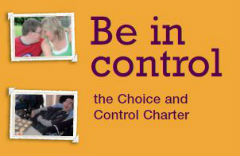 The charter says:
The charter says:
- you should have a person-centred plan and have control of it
- you should have the offer of Direct Payments
- you should be involved in choosing staff
- you should have the choice of being at meetings that are about you and that make decisions that affect you
- you should help to run the services you get
- you should be supported to do the things you want to do
- you should be supported with your friendships and relationships
- you should be listened to when you are worried and upset and know that something is being done about it
- you should be able to live in a way that suits you
- you should have help to understand things and to tell people what you want them to know
- you should have help to stay healthy
- you should have a choice of where you live and who you live with
Important factors that influence the charter are:
- Valuing People Now says that having choice and control over your own life is a human right
- Putting People First says we should accept our shared responsibility to create a high quality, personalised system which offers people the highest standards of professional expertise, care, dignity, maximum control and self determination
- Disability Discrimination Act makes it unlawful to discriminate against people in connection with employment, the provision of goods, facilities and services
- Disability Equality Scheme says that disabled people should have full opportunities and choices to improve their quality of life and will be respected and included as equal members of society
The charter reminds all public services and community organisations that people must be treated fairly and equally. It was produced and promoted in partnership with people with learning disabilities, staff and family carers.
The charter has made significant progress since the launch in 2008 and has been embraced by us but it's important to check the extent of this impact. This is particularly important as it highlights the needs of and obligations to, all people with disabilities within Derbyshire, including hard to reach groups, for example people from black and minority ethnic groups and people with profound physical and intellectual disability.
The charter encourages people and their families to have high expectations of support offered by all public services and community organisations.